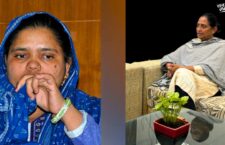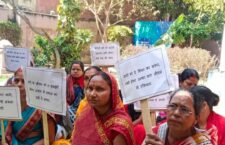‘Bilkis epitomises courage. Her name signifies resilience in the face of adversity.’ – Shobha Gupta
For our International Women’s Day special feature, Khabar Lahariya’s Managing Editor, Meera Devi, speaks with Advocate Shobha Gupta, who led the fight for Bilkis Bano. Gupta, Bilkis’ lawyer for over two decades, refers to her as the embodiment of ‘himmat’ (courage). In this exclusive interview with Meera, Gupta reflects on the case – from its challenges to triumphs, turning points, intricacies of the legal system, the media’s role and the resilient woman at its forefront, Bilkis.
Shobha Gupta was recently honored with the title of Senior Advocate by the Supreme Court at the age of 54. She has held the position of standing counsel for the National Human Rights Commission for fifteen years, and is widely respected as one of the most fearless members of the Supreme Court Bar Association.
Read on for excerpts from the interview and watch the full interview Here.
Meera: Being a women-run team, Khabar Lahariya often faces criticism for our focus on women related issues and the adoption of a feminist perspective in our reporting. In your advocacy work, particularly with Bilkis’ case, have you encountered comparable criticisms regarding women advocating for, and defending, other women, with such efforts being categorised solely as women’s issues?
Shobha Gupta: We must confront the root causes of crimes against women and question why the responsibility of addressing these issues predominantly falls on women themselves. Injustices, especially those against women, are societal issues, not just women’s issues. When a crime is committed against a woman, it impacts her family and society as well. The pain of the victim is amplified when they see their loved ones suffering. Labeling these as ‘women’s issues’ undermines our society by implying they are not universally relevant. In reality, these are societal injustices demanding collective attention. The responsibility of combating these issues lies with everyone in society, not just the survivors and victims.
Meera: In our experiences reporting from rural and remote areas, where violence against women is almost a daily occurance, we’ve observed that the judicial system often feels inaccessible, and seeking legal recourse can be emotionally and financially draining. How did you navigate these challenges in Bilkis’ case?
Shobha Gupta: Regrettably, the government and state did not provide the necessary support to Bilkis Bano during her ordeal. Escaping from a crime is just the beginning; surviving and fighting for justice is a long and arduous journey. It involves daily court visits, consultations with lawyers, and financial resources. Moreover, it requires immense courage as litigation is not a one-day affair. The legal process in Bilkis’s case began in 2004, two years after the incident occurred in 2002. In 2003, a closure report was issued, and the Supreme Court transferred the investigation. The trial started in 2004 and concluded in 2008, spanning a total of eight years. It would have been challenging for Bilkis to navigate this process alone. Fortunately, she had the support of a team of social workers who stood by her throughout this journey.
Meera Devi: Drawing from our experience of reporting on violence against women, let’s take the recent case in Hamirpur, where a newlywed woman succumbed to injuries from her partner’s sexually violent behaviour. In such instances, the police tend to mislead the victim’s family or refrain from registering a complaint. In such challenging circumstances, how does one effectively pursue legal recourse?
Shobha Gupta: Introducing fundamental legal education in schools could be a transformative step in shaping societal attitudes towards gender-based violence. Just as children enact skits of fairy tales, incorporating informative skits about the consequences of crimes against women and teaching respectful behavior within society can equip them with essential knowledge.
Education serves as a powerful tool for instilling awareness and fostering a culture of accountability. By educating students about their rights and legal pathways available for addressing violence against women, families may feel more empowered to take decisive action when faced with such situations.
Meera Devi: With the growing challenges in accessing the judicial system, especially in semi-rural and rural areas, what can be done to alleviate these obstacles and ensure equitable access to justice?
Shobha Gupta: Indeed, the biggest challenge lies in the delay of justice. The day when justice is delivered promptly, and cases are resolved swiftly by the High Court and Supreme Court, it will leave a lasting impact on the public. This will serve as a deterrent for potential perpetrators, who currently are emboldened by the often-delayed legal process. Hence, it’s crucial to ensure that these issues do not fade from public consciousness.
Meera Devi: Could you elaborate on the support provided by non-governmental organizations (NGOs) and social workers for Bilkis, and why their support was pivotal in her case?
Shobha Gupta: Bilkis was pregnant and found herself alone in the wilderness, surviving against all odds. She waited atop a hill for dawn to break, resorting to using clothes from a corpse. Eventually, she reached a nearby village and asked for clothes. When she returned, she was in the relief camp. As more people arrived, she shared her story word by word. Her resolve was such that she believed justice was necessary, no matter the cost. Despite the immense challenges, including having to relocate 17 times during the trial, lacking a steady income, and her children’s education being disrupted, she never gave up her fight for justice. Is it that easy to do that?
While the law does provide for legal representation, the process of seeking justice can be fraught with challenges. Registering an FIR can be a daunting task in itself, and there’s a chance that the police might settle the case with the offender. The offender might harbor resentment due to your complaint and disagreement, which could potentially put you in danger. Additionally, if the public prosecutor fails to effectively present the arguments, it could jeopardize the case. Each stage of the process carries its own risks. Pursuing justice also requires resources, which is why the support of an NGO can be crucial, as the victim often bears the brunt of these challenges.
Meera Devi: When evaluating the media’s role in Bilkis’s case, how would you assess their coverage and the impact it had?
Shobha Gupta: It’s truly heartening to belong to a nation where solidarity isn’t just an idea but a tangible reality. Bilkis never had to endure her struggles alone; she was surrounded by a community that stood firmly by her side. This wasn’t just a handful of individuals, but an entire society, including social workers and lawyers from various courts, united in support of Bilkis. Throughout her journey, the media played a crucial role, consistently amplifying her story despite shifting political landscapes and changing times. From 2002 to 2024, amidst all the changes, the media remained steadfast, lending its voice to the pursuit of justice, often louder than our.
Meera Devi: On a personal level, how did Bilkis’ case emotionally affect you?
Shobha Gupta: Each time I revisit the details of the case, the pain intensifies. Even in recent discussions, it still deeply affects me. With every line, the details get more piercing.
Meera: Even now, I can sense the emotional toll the case has on you.
Shobha Gupta: Yes, it will always remain like that because it was such a horrifying case. The recurring reminders of the torture endured in this case are painful. As a lawyer, the emotional trauma of dealing with such cases is immense. It’s impossible to distance oneself from such a case. We often remain unaware of what transpires in regional courts.
I have served as an advocate in the Supreme Court, but we weren’t always present locally. The Hathras incident compelled me to form ‘We The Women’. The horrific act of the police burning her body in front of her family members by pouring kerosene was unfathomable. It raises questions about society’s perception of a woman’s body. The pain I felt 20 years ago intensifies each year as my understanding deepens, impacting me even more. Even though we weren’t directly affected, we’ve all experienced its pain, which still lingers. It’s almost unbelievable to comprehend the kind of people who decide to end someone’s life. Fortunately, Bilkis is alive. Despite the pain, she has a life beyond it.
Meera: How do you think Bilkis’ case will be remembered in Indian feminist history?
Shobha Gupta: What I’ve always emphasised about Bilkis’s case is the remarkable courage she displayed in the face of adversity. When we remember Bilkis, it’s important to focus on her resilience rather than solely on the injustices she endured. To me, Bilkis’s name epitomises courage. You tell someone, ‘You have a lot of courage’, you can just say- ‘Oh you are Bilkis!’ Moreover, the Supreme Court deserves recognition for its commitment to justice and its elevation of Bilkis’s case to a position of great significance. Whenever Bilkis’s name is mentioned, it symbolises not just her individual struggle, but also the support and empowerment provided by the highest court in the land. This support has been instrumental in sustaining Bilkis’s courage. As citizens, we aspire to have the same level of backing from our justice system in our own endeavours.
Read the related and in depth article in hindi (here).
Written by Sejal
‘यदि आप हमको सपोर्ट करना चाहते है तो हमारी ग्रामीण नारीवादी स्वतंत्र पत्रकारिता का समर्थन करें और हमारे प्रोडक्ट KL हटके का सब्सक्रिप्शन लें’


